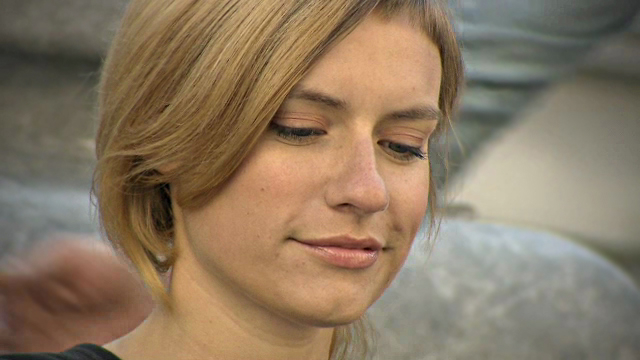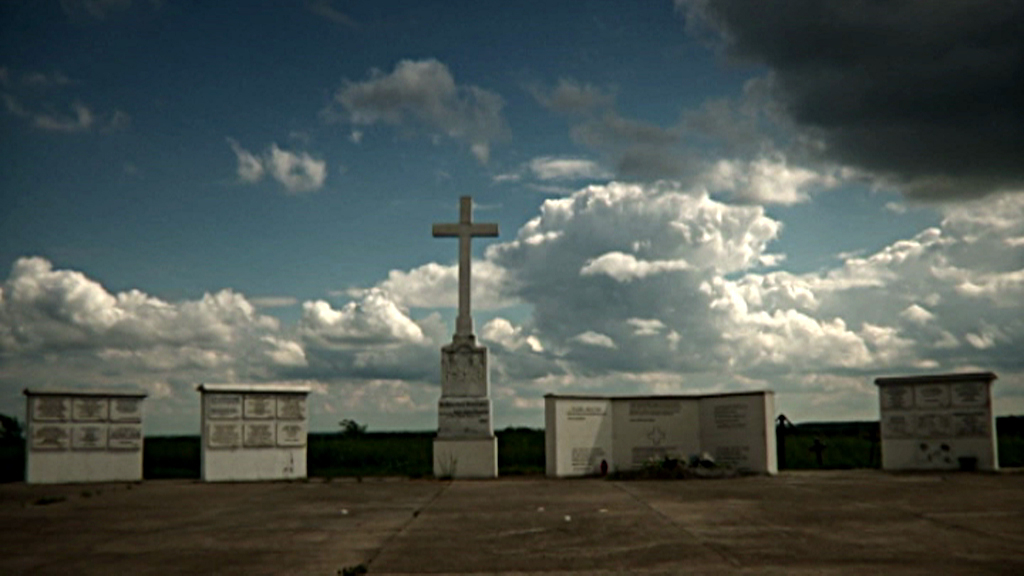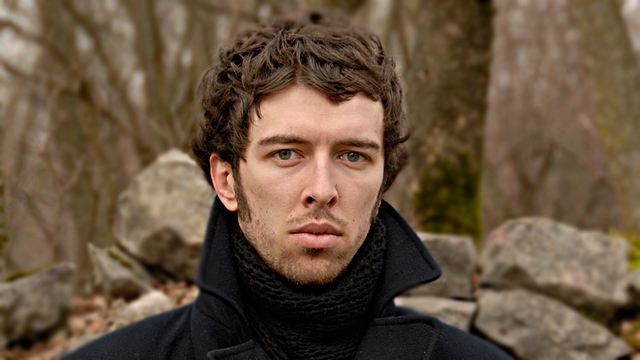Donauschwäbische Kulturstiftung fördert serbischen Film
Im Juni 2011 soll das bemerkenswerte Filmprojekt abgeschlossen sein. Schon jetzt will die Donauschwäbische Kulturstiftung auf den Dokumentarfilm “Die Donauschwaben” hinweisen. Weil es sich um ein außerordentlich professionelles Projekt eines jungen serbischen Filmemachers aus Groß-Betschkerek (Zrenjanin/Banat) handelt, hat sich die Donauschwäbische Kulturstiftung nach Sichtung des Filmmaterials dazu entschlossen, diesen zweisprachigen Film (serbisch/deutsch) ideell und finanziell zu unterstützen.

Thematisiert werden die Verbrechen an den unschuldigen deutschen Zivilisten zwischen 1944 und 1948. Die Befragung von Erlebnisträgern wird kombiniert mit einer fiktiven Handlung, die in der Gegenwart spielt. Eine junge Frau aus Deutschland (Maria Schneider) ist auf der Suche nach dem Haus ihres Großvaters in der Vojvodina. Auf ihrer Suche lernt sie Miso kennen, einen jungen Mann, dessen Vorfahren nach dem Zweiten Weltkrieg aus Montenegro in die Batschka kamen. Sie verlieben sich ineinander. Maria Schneider findet das Haus ihres Großvaters, das seit 50 Jahren verlassen ist. Vom Bürgermeister erhält sie die Erlaubnis, in diesem Haus ein Fotostudio einzurichten. Doch es gibt kein glückliches Ende. Nationalisten brennen das Haus nieder und vertreiben das junge Paar – Maria ergeht es wie ihrem Großvater.
Da der Etat der Filmproduktion noch nicht vollständig gedeckt ist, will die Donauschwäbische Kulturstiftung zu finanzieller Unterstützung dieses so eindrucksvollen Projektes ermutigen.
Kontaktdaten:
MANDRAGORA FILM
Barnic Nedeljka 2, 23000 Zrenjanin
Email: mandragorafilm@gmail.com
Internet: www.mandragorafilm.com
Bankverbindung (bank details):
Intermediary:
DEUTDEFF
DEUTSCHE BANK AG
FRANKFURT AM MAIN, GERMANY
Account with institution:
SWIFT CODE: DBDBRSBG
BANCA INTESA AD, BEOGRAD
MILENTIJA POPOVICA 7B
BEOGRAD, REPUBLIKA SRBIJA
Beneficiary:
IBAN: RS35160005080003811922
UDRUZENJE GRADJANA MANDRAGORA FILM
BARNIC NEDELJKA 2
ZRENJANIN, REPUBLIKA SRBIJA
In englischer und serbischer Sprache nun eine Selbstdarstellung der serbischen Produktionsfirma:
Working title: THE DANUBE SWABIANS
Director and scriptwriter: MARKO CVEJIC
Duration: 90min
Production: MANDRAGORA FILM
This film tells the story of the Danube Swabians: a people who are descendents of the earliest German tribe that settled in the Vojvodina region in the 18th century, in pursuit of a better life. It follows their destiny from the beginning of their immigration to this area, until the present day, it intends to research in greater depth the mutual Serbo-German past in Vojvodina. It will cast a light on the following aspects: the begining of immigration of Germans in this area, their role in development of this deserted and undeveloped region, their part in World War II and their attitude towards the local population, the mass graveyards of ethnic Germans, the confiscation of their property, as well as their position today, in contemporary Serbia. It intends to provoke reflection on the taboo of collective guilt placed on the entire ethnic German population in Vojvodina, as well as on the existence of destructive and manipulable nationalist tendencies that still have considerable relevence to this multi-faceted territory today.

Vojvodina lies in the northern part of Serbia, on the Pannonian plain. This region, for centuries part of the Austro-Hungarian Empire, is known for the diversity of its culture, belonging not only to the Serbian majority, but to all the ethnicities of the region. With over 30 ethnic groups, Vojvodina is one of the most heterogeneous regions in Europe.
Before the Second World War, more than half a million Swabians lived in Yugoslavia, mainly in Banat region. Until 1992 there was absolute silence regarding all things that had happened to the Swabians in Yugoslavia after October 1944: they were banished from their homes, had their property confiscated, children and the elderly were thrown into concentration camps, where about 47 000 died due to forced labour, hunger and illness. An estimated 400 000 Swabians were expelled from Vojvodina. All their property, citizenships and human rights were taken from them, as they were charged with having collaborated with the Nazi occupiers.
The catastrophic outcome for this group was their almost total disappearance from the area. According to the official report of the last 2002 census in Vojvodina, 3 981 people had the courage to declare themselves as of German ethnic origin. A small number of Germans living in Serbia today formed associations in attempts to preserve their national identity through the re-learning of and preservation of their language, by nourishing their customs, by becoming acquainted with the history and culture of their nation and above all through the regulation of German-speaking minority status in order to cast away the anathema of collective German guilt, also to provide their children with an opportunity to travel to and study in Germany.

In the year 2000, the Provincial Parliament of Vojvodina adopted a resolution on the non-admission of collective guilt and stated that by this act the atmosphere of trust and co-operation with the Danube Swabians had been re-established. Official Serbian Parliament never did it.
Marko Cvejic, born in 1978 in Zrenjanin, Yugoslavia. Graduated film and theater directing at the Art Academy in Novi Sad. Finished master studies of film and media at the FDA in Belgrade. Founder and president of the independent production MANDRAGORA FILM. Made over ten short and feature lenght films. Teaching at Film School of DKSG (Culture Centre Student City) Belgrade subject “film language and editing”. In past couple of years he has been exploring and presenting culture and tradition of many nations who live in his neighbourhood.
Mandragora film was opened in 2006 to make creative documentary films that aim to raise awareness about forgotten traditions and cultural roots so often the basis for the questions at the heart of societal issues today. By using a part fictive, part authentic documentary film style, the intricate historical, political and societal contexts of the theme focused on are highlighted through poignant human stories. Our common goal is to creatively follow the trends of presenting the reality of our life through the resurrection of long-forgotten values in conflict with the modern trends of living communities.
Directors statement:
I grew up in the town of Zrenjanin where I was early introduced with the vivid culture and customs of various nations lived in my surroundings. The past events and relations should be explained for the ability to look towards a peaceful, better future with the minimal prejudice. I feel it is crucial to raise awareness in an objective way about the harm that is created when tarring a whole community with the same brush of collective guilt: about the destruction created in the life of individuals, the consequential of victim mentality that is created and the reproduction of these situations time and again in history. Not in order to reveal or write some kind of a new view of history, but to give a chance to speak for those who haven’t had that chance yet, either for repression, fear or personal destiny. A sensitive parallel can be drawn between contemporary Serbia and Germany after WWII. Particularly at this time, twenty years after the fall of the Berlin wall when certain battles have come so far, and yet others, in Serbia are still very fresh. It is clear that only tolerance and a will to understand others can help to move Serbian society forward, away from close minded, backward looking politics and towards a more open integrated world.
Radni naslov: PODUNAVSKE ŠVABE
Scenario i režija: MARKO CVEJIĆ
Trajanje: 90min
Produkcija: MANDRAGORA FILM
Ovo je priča o ”Podunavskim Švabama”, potomcima najmlađeg nemačkog plemena koje se, u potrazi za boljim životom, doselilo na teritoriju Vojvodine u XVIII veku. Priča prati njihovu sudbinu od samih početaka naseljavanja u ovu regiju, preko položaja za vreme Drugog svetskog rata, pa sve do sadašnjeg vremena.
Tematski, film se bavi obradom zajedničke prošlosti, ulogom naseljenih Nemaca u razvoju kulturno - infrastrukturne pozicije Vojvodine, pitanjem masovnih grobnica Nemaca u Vojvodini, pitanjem oduzete imovine, ulogom vojvođanskih Nemaca u Drugom svetskom ratu i njihov odnos prema lokalnom stanovništvu i njihov položaj u savremenoj, demokratskoj Srbiji. Film namerava da rasvetli tabu kolektivne krivice koja je još uvek prisutna, kao i uticaj destruktivne, manipulativne, nacionalističke politike koja još uvek ima uticaja u našem društvu. Ovo je potrebno kako bismo neopterećeni mogli nastaviti zajednički život u multietničkoj Vojvodini.
Vojvodina je severni deo Srbije koji predstavlja mesto preporoda i očuvanja srpske kulture, iako je vekovima pripadala Austrougarskoj, odnosno Habsburškoj monarhiji. Poznata je po svojim ogromnim kulturološkim vrednostima, ne samo srpske, kao većinske kulture, već i svih naroda koji u njoj žive. Sa preko 30 nacionalnih grupa, multietnička Vojvodina je, posle Londona, najraznovrsnija regija u Evropi.
Uoči Drugog svetskog rata u Jugoslaviji je živelo više od pola miliona Nemaca. Po brojnosti su bili druga nacionalnost u Vojvodini. Događaji neposredno posle rata bili su tragični za mnoge narode u Vojvodini, a posebno za Podunavske Švabe. Do 1991. god. je vladao savršeni muk o svemu onome šta se dogodilo sa Nemcima u Jugoslaviji posle oktobra 1944. godine: o proterivanju iz njihovih kuća, o konfiskaciji imovine, o formiranju logora za prinudni rad, o masovnim grobnicama. Na teritoriji bivše Jugoslavije u posleratnim logorima, od teškog rada, gladi i bolesti stradalo je oko 47 000 žena, dece i staraca, a preostalih oko 400 000 Nemaca je proterano iz svojih kuća i poseda. Njima su oduzeti imovina, državljanstvo i sva građanska prava.
Krajnji rezultat je tužna činjenica da je nacionalna manjina, koja je više od dva veka davala snažan pečat privrednom i kulturnom razvoju srednjeg Podunavlja, gotovo nestala sa ovih prostora. Po službenim podacima poslednjeg popisa iz 1991. godine, u Vojvodini se smelo izjasniti oko 4 000 Nemaca. Oni su okupljeni u udruženja u želji da sačuvaju svoj nacionalni identitet, ponovo nauče svoj maternji jezik i neguju običaje svog naroda.
Skupština Autonomne pokrajine Vojvodine 2000. godine donela je Rezoluciju o nepriznavanju kolektivne krivice nemačkog naroda i ocenila da je tim činom ponovo uspostavljena atmosfera poverenja i saradnje i sa Podunavskim Švabama. Parlament Republike Srbije ovakvu Rezoluciju nikada nije doneo.
Marko Cvejić, rođen 1978 u Zrenjaninu, Jugoslavija. Diplomirao filmsku i pozorišnu režiju na Akademiji umetnosti u Novom Sadu, magistrirao na odseku film i mediji, FDU, Beograd. Osnivač i predsednik nezavisne produkcije MANDRAGORA FILM. Napravio više od deset kratkih, srednjemetražnih i celovečernjih filmova. Od 2005. predaje Filmski jezik i osnove montaže u filmskoj školi Akademskog filmskog centra, Beograd. U poslednjih nekoliko godina istražuje i prezentuje kulturu i tradiciju naroda i etničkih grupa koji žive u njegovom okruženju.
MANDRAGORA FILM je mlada produkcija koja kroz svoj rad pokušava da podigne svest o davno zaboravljenoj tradiciji i kulturnim korenima. Kroz dokumentarno igranu formu, pokušavamo da otkrijemo i zabeležimo istoriju koja se sačuvala uprkos modernom vremenu. Kroz priče koje beleže svojevrsne duhovne i tradicionalne vrednosti težimo da ukažemo na postojanje različitih kultura i naroda u cilju podsećanja, beleženja i negovanja najvrednijih estetskih osećanja.
Rediteljska eksplikacija:
Odrastavši u Zrenjaninu, od rane mladosti sam se upoznao sa šarenolikošću kulture i običaja raznih naroda koji su živeli u mojoj okolini. Potrebno je rasvetliti događaje i odnose iz prošlosti, zarad mirnije budućnosti. Od ključnog je značaja da se na objektivan način podigne svest o neopisivoj šteti koja se nanosi kada celu zajednicu označimo nosiocem iste kolektivne krivice, o uništenim životima pojedinaca, o posledicama na psihu i mentalitet žrtava. Ne da bismo otkrili ili napisali neki novi pogled na istoriju, već da bismo dali šansu da govore onima koji još uvek tu šansu nisu imali, bilo zbog represije, straha ili ličnih sudbina. Moguće je povući paralelu između savremene Srbije i posleratne Nemačke. Pogotovo u ovom trenutku, dvadeset godina posle pada Berlinskog zida, kada su mnoge bitke završene, a ipak u Srbiji miris minulih bitaka je još uvek vrlo svež. Potpuno je jasno da nam samo tolerancija i volja za razumevanjem drugih može pomoći u kretanju napred, u širenju vidika, gledajući napred prema otvorenijem i integrisanom svetu.
2011-03-10